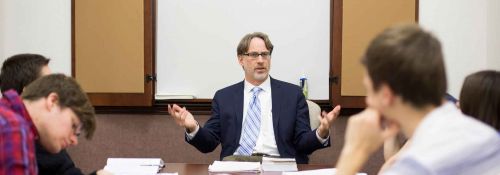
Seek Ye First the Liberal Arts
How Intellectual Curiosity Leads to Greater Success in Law School
Written by Madeleine Jepsen
When Professor of Philosophy and Religion Nathan Schlueter gives advice to pre-law students, he often finds himself repeating the following advice: “Seek ye first a great liberal arts education, and success in law school will be given unto you.”
“I don’t mean to sound impious,” he said, “but it’s true.”
Schools like Hillsdale College often attract students who are interested in attending law school after graduation and are attracted to Hillsdale by its well-rounded education rooted in the Western tradition. Often, however, students fall into the trap of “calculating” their way to the skills they want to develop for law school and fail to immerse themselves in the liberal arts. Rather than dive into texts for the sake of understanding them, they approach learning as a series of hoops to jump through. Professional skills are then the reward for doing so.
This mental pitfall not only short changes students of a quality education; it can prevent them from gaining the very skills they’re attempting to acquire.
“If you’re just calculating your way through it, you’re going to miss the heart of it,” Dr. Schlueter said. “It’s only when you’re actually savoring the education that you truly gain a richness of those skills that translate into law school.”
Dr. Schlueter said some of the best law students didn’t even consider law school until their senior year, but they had the intellectual curiosity and dedication to true understanding that stem from the proper mindset: a true love of learning.
This can take many forms, from choosing to take a challenging elective class to reading a challenging book not required for homework. Whatever the context, a love for the liberal arts moves beyond the mere skills of critical thinking and reasoning.
“There has to be a kind of curiosity,” Dr. Schlueter said. “There has to be a kind of imaginative facility with moving across topics and disciplines. There has to be a love of figuring things out and problem solving. It’s not just abstract skills. There has to be a kind of interest and motivation.”
This is what inspires a biology major to take an ethics class or a business major to take music lessons. By delving into the learning and making connections between disciplines, students foster the intellectual virtues of understanding and wisdom, which go much deeper than any pre-professional skill.
“Aristotle and Aquinas are pretty clear about what these virtues are,” Dr. Schlueter said. “They’re motivated by the love for its own sake, by a sort of comprehension of the essences of things, the causes of things, moving toward unified explanations. Those are the intellectual virtues, and I would hope that students would be getting those no matter what their major is, just through the core curriculum, through the reading of the great books, and these other things.”
By applying a passion for learning to the subjects they love, students can come to a better understanding of their relationship with the world around them and order their lives wisely, both during college and beyond.
“Just immerse yourself in what you love, and invest yourself in it,” Dr. Schlueter said. “Not as a minimalist, but organize your life around the things that we’re doing here. Try to write a great paper. Try to read a difficult book and understand it. Try to have good conversations. Try to work out your excellence in something that’s not directly related to a class.”
Madeleine Jepsen, ‘18, studies biochemistry and journalism. Outside the classroom, Madeleine serves as a reporter and assistant editor for the Collegian. She is also involved in Catholic Society.